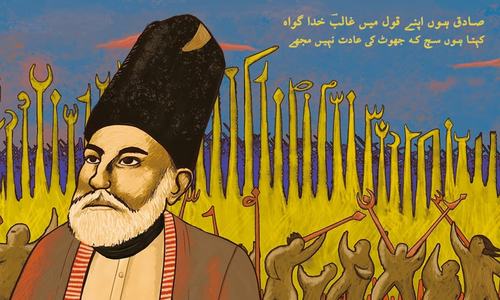KARACHI: Habib University on Thursday evening organised a webinar on ‘All Alone in Lucknow — Yagana, the Ghalib-Breaker’ as part of its Islam After Colonialism series.
Prof Dr S. Akbar Hyder of Department of Asian Studies at the University of Texas delivered a talk on the occasion.
Dr Hyder said in the summer of 2007 he was in Lucknow researching Yas Yagana Changezi, the poet who had stirred up more controversy than any other in the history of that city, when he was introduced to Tajassus Ejaz. Their mutual acquaintance had connected him to Tajassus sahib because the latter was an avid collector of Sarfaraz, the popular weekly magazine in Lucknow’s Shia community that had been instrumental in inciting violence against Yagana. His acquaintance also informed him that Tajassus sahib was one of the 11 men who had walked in Yagana’s funeral procession.
He recounted for him (Dr Hyder) the stories of Yagana’s Lucknow tribulations. He also speculated that perhaps Yagana would not have suffered the fate that he did if more people had known about his final hours when the poet summoned three friends to his deathbed to bear witness to his kalima recitation.
The scholar also mentioned his meetings in Lucknow with the eminent short-story writer Naiyer Masud. Much that he had to say on Thursday was indebted to those meetings and to the fantastic scholarship of those who had fashioned Yagana studies.
Scholar says the 20th-century poet was possessive when it came to protecting Urdu
Dr Hyder said Yagana was named Mirza Wajid Husain by his father. He moved from Azimabad to Lucknow around 1914. The poet gave himself names that would eventually lead him into isolation and contribute to his notoriety for decades to come. He first called himself Yas Azimabadi (despair from Azimabad). Azimabad is another name of today’s Patna. He married into a Lucknow family but never received the treatment owed to a South Asian son-in-law. Lucknow was a difficult city. The canon guardians of the city believed their Urdu to be superior to all other Urdu modes. Yagana never let down his Azimabad connection. His writings provided a mere sideshow to his émigré experience for the rest of his life.
Dr Hyder said Yagana was possessive when it came to protecting Urdu as Urdu, not as Persian or Arabic but as a composite language. It was this concern with the Persianisation of Urdu that helped Yagana launch his earlier critiques of Mirza Asadullah Khan Ghalib.
Just when the diwan of Ghalib was rendered on a par with the divine Vedas, Yagana began to discern idioms in Ghalib’s Urdu poetry that were acceptable in Persian but not in Urdu. He discerned, among other things, the pretentious Persianisation of Urdu that made the ghazal experience (in his opinion) tedious and contrived. His series of essays and quatrains as critiques of Ghalib’s language ultimately formed the book which he’s most closely associated with, Ghalib Shikan (the Ghalib breaker).
The scholar said Yagana attacked on the moral front as well. He spins polemics around Ghalib’s personal life choices and actions by first rendering him an opportunistic sycophant. He doubts Ghalib’s patriotism by reminding his followers that Ghalib basked in wine and revelry while his patron Bahadur Shah Zafar was dying in Rangoon. Ghalib ingratiated himself with the British by writing a qasida for Queen Victoria.
But, Dr Hyder said, the Mirza of Azimabad (Yagana) had plenty of praise for those couplets of Ghalib that talked of desires and longings. For instance, Yagana marvels at the doomsday raising resignation in the radeef ‘he sahi’ (so be it) of the following well-known Ghalib ghazal:
Yaar se chhed chali jaey Asad Gar nahin wasl to hasrat he sahi
[Let the flirtation continue with the beloved, Asad If not the union, then longing would do]
And Yagana never failed to mention that which he shared with Ghalib — love for Hazrat Ali:
Dono deewaney hain Ali ke talib Jaan ek hai go juda juda hain qalib Mazhab mein, shairi mein, quamiat mein Ghalib hain Yagana aur Yagana Ghalib
[Both these mad ones seek Ali Their soul is one, although their bodies are apart In faith, in poetry and in community Ghalib is Yagana and Yagana is Ghalib]
The scholar claimed it’s a clear identification of that which binds the two lovers to one beloved. This tribute also represents a setback to those who pitted Yagana against Ghalib in oversimplified terms.
Dr Hyder in the last part of his talk spoke on Yagana’s criticism of the likes of Allama Iqbal, Asghar Gondvi and some other poets.
Dr Nauman Naqvi and Dr Sajjad Rizvi, both associate professors at Habib University, were the discussants.
Published in Dawn, May 29th, 2021














































